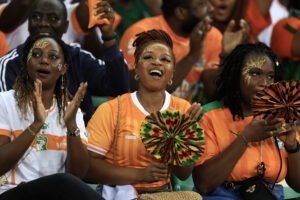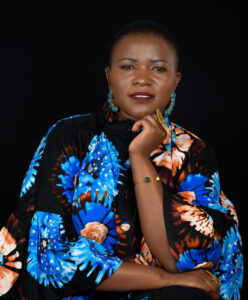The African Cup of Nations (AFCON), currently taking place in Côte d’Ivoire, has every eye on the West African country. Surprising early exits by top teams have marked the exciting tournament, leading to an eagerly anticipated final between hosts Côte d’Ivoire and Nigeria. The COCAN, the Organizing Committee of AFCON, and, by extension, Ivorians have made it their mission to show great hospitality to thousands of Africans from around the continent who have come to support their teams. It’s all well with the traditional Ivorian Akwaba (welcome).
But when you welcome someone into your home, be ready for them to see all that happens there. The good, like the dry sense of humour that has made Ivorians famous around the world with banters thrown in jest like “The Cup stays” or “It’s our AFCON; we organize it how we wish” when Côte d’Ivoire massively lost 4-0 against Cap Verde.
While the organising has been excellent, one particular moment caught on TV at the end of a thrilling Senegal vs Côte d’Ivoire game, which saw the reigning African champions eliminated on January 29, trended across the continent.

While most Ivorians were ecstatic with the win and celebrating the impossible mission they had just achieved, one man dared to use the moment to harass a female fan. The man was visibly forcefully talking to a woman whose expression showed she was uncomfortable with the invasion of personal space and telling the man to back off. The female fan gestures with her hand and leans back, but this man is unrelenting in his entitlement. Later, we would learn that the man is an Ivorian named Anselme Santos. The woman he harassed was a Senegalese fan.
As he trended online and became a joke and an embarrassment, he sought to address the matter. He was invited to a television set of Life TV, an important and influential TV and radio network in Côte d’Ivoire, “to give his side of the story.”
The TV host introduced Santos: “He’s been all over the internet against his will.” One wonders whether the female fan whom he harassed wanted her face plastered all over the internet and on various media. This “tell his side of the story” and being given a platform to explain away and diminish the impact of his actions, unfortunately, is what we often see the grace granted to men to get away with sexual harassment and predatory behaviors that make the participation of women in public life hell.
Santos spoke about how it was all fun and games. To the question of what exactly he was doing, he said, “I told her ‘give me your number. Give me your number’. There is no harm in that.” He added that he was “a big boy” who wouldn’t go “to a stadium to chat up a woman with all the cameras around.” He concluded by apologizing to the “woman, to her family, her community, her husband, her children, because we were not expecting this, and it happened.”
Life TV invited Ghislain Coulibaly, a sociologist and gender expert and Francine Aka Anghui, the president of the Association of Women Lawyers of Côte d’Ivoire, to speak on the matter. Aka-Anghui pointed out that the video affirmed the call made by gender advocates for an African Cup of Nations without violence.
“When we made the call, people thought, here they go again, these women with their women issues.”
We must reflect on the comments made in the aftermath of the video. It was disconcerting to hear from the invited (male) gender expert, who portrays himself as a He for She champion, say that Santos “coming on TV to apologize to the woman and the nation must be noted as exemplary on his part and as such, is a He for She himself, showing his commitment to women’s issues.”
Many men’s reactions on social media ranged from “We’ll expect you to make the first move” to “It’s really unhealthy to make a big deal out of everything” and “At this rate, one wonders whether a simple greeting might not be an offence against this gender.”
Note the use of the term: this gender. A gender that cannot be named so much it disgusts. Then some claimed not to see the problem: “Where is the harassment? He only asked for her number, only that”, “I don’t think he deserves all that heat. He got taken into the euphoria of victory…”
Abusers and oppressors often dismiss victims’ reactions as overreactions, claiming that protecting them would inconvenience the harasser. This man, who invaded a woman’s personal space to the point where his hat touched her forehead, showed no concern for her well-being. Disregarding her visible discomfort enables predatory behavior. The expectation that women tolerate such violence is widespread, and for many, this incident was a disturbing echo of their own experiences.
Ahead of the AFCON, Ivorian feminists were creating awareness about sexist violence that could occur and sharing toll-free numbers that anyone, victims of gender-based violence, could call on. However, the local organizing committee did not take up this raise of concern or even the Ministry for Women, Family and Children until January 29 when the Ministry with the COCAN signed a partnership with Akwaba Mousso, a women’s shelter, the first of its kind in Côte d’Ivoire. An App, CAN sans harcèlement – an AFCON without harassment – was finally launched on January 29.

This is not the first time in Côte d’Ivoire that women have had to push back against normalizing patriarchal violence. The country has had a Minister in charge of Women’s Affairs since 1963. In 1996, feminist activist Constance Yai, through her organization Association ivoirienne pour la défense des femmes (AIDF ), organized with other members to free Fanta Kéita, who had been imprisoned for killing the man she’d been forcibly married to. Her age was guessed to be 11 or 12, but her father claimed that she was 16 when the event happened. Before that, it was women in 1949 who were marching against the French colonizers in Grand Bassam, contributing significantly to the decolonization process that led to Côte d’Ivoire gaining independence in 1960.
The media’s contribution to perpetuating violence against women, especially in Côte d’Ivoire, by providing platforms for perpetrators to spread sexism and victim-blaming is not new. In September 2021, on the set of a popular TV program on the Nouvelle Chaîneivoirienne (NCI), a guest presented as a “former rapist” was encouraged by the presenter, Yves de Mbella, to simulate a rape on a plastic mannequin. The offensive incident gained front-page attention in Ivorian and international media, prompting women’s rights activists to organize a sit-in at the TV station, demanding action.
End sexual harassment in stadiums
Ivorian feminist activists say that hosting the Cup of Nations should not compromise women’s safety. They criticize the silence of COCAN, the Ivorian Football Federation, and the government. Sexual harassment at public events and such behavior, exemplified by Santos’s actions, deters women from attending football matches and limits their freedom.
Men continue to dominate sports arenas and discourse despite women increasingly breaking barriers in African men’s football, from attendance to roles like commentary, refereeing, and journalism. Major events like AFCON exacerbate the risk of various forms of gender-based violence, such as verbal, non-verbal, physical, and sexual harassment, abuse, and exploitation. Sexism in stadiums greatly influences women’s attendance at matches.
Women often face unwanted physical contact and attention during men’s football games and are also vulnerable during post-match celebrations, needing to stay vigilant regardless of the game’s outcome.
For instance, when Senegal won their first African Cup of Nations in February 2022, it was a heroic and historic win, and the team was welcomed with victory rallies back home. However, what didn’t make big headlines was the incidents of sexual assaults on girls and women during the celebration.
Integrating gender-based violence (GBV) prevention and response into security measures at major events is crucial to protect women, girls, and other vulnerable groups. Hosting governments and football organizations often overlook the safety challenges for women and children posed by large crowds of supporters gathered for extended periods and need to address these issues effectively.
Tolerating sexist behavior from individuals like Santos and dismissing it as harmless banter only reinforces gender stereotypes that uphold sexual harassment, signalling to women that their safety and dignity in football stadiums are not priorities. The Confederation of African Football (CAF) and hosts need to take decisive action to ensure that football stadiums and the environment around major events uphold a zero-tolerance policy towards sexual harassment and other forms of gender-based violence. This change is necessary at the next AFCON.

Edwige Renée Dro is a writer and literary translator from Côte d’Ivoire. In 2020, she founded 1949: the library of women’s writings from Africa and the black world in Abidjan.
 Rosebell Kagumire is a pan-African feminist writer and activist. She is the editor of Africanfemism.com.
Rosebell Kagumire is a pan-African feminist writer and activist. She is the editor of Africanfemism.com.
